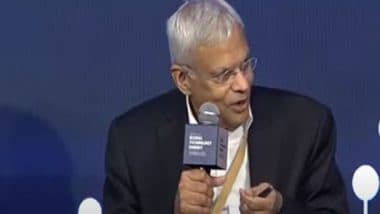New Delhi [India], April 12 (ANI): Noting that India has correctly assessed US President Donald Trump's objective of imposing tariffs and is attempting to address those concerns, a top geopolitics expert said on Saturday that New Delhi is willing to drastically reduce tariffs in the hope that there will be some reciprocal benefits.
Ashley J Tellis, Tata Chair for Strategic Affairs and Senior Fellow, Carnegie Endowment for International Peace, said that US President Donald Trump's target is increasing market access in India and the administration had tried to negotiate a package to address tariff barriers during the first time. However, that did not come to conclusion.
Speaking at the Carnegie India Global Technology Summit during the session 'Tariffied World: T minus' on Saturday, Tellis said Trump has held strong views about the global trading system for many decades and is now in a strong position to act on those views. He stated that the actions taken in the past several weeks are consistent with complaints that he has had for a long time but there is no grand strategy.
He said there is need to resist the temptation to think that there is a grand strategy with respect to the way tariffs are being used as penalty instruments.
Also Read | Earthquake in Pakistan: Quake of Magnitude 5.8 on Richter Scale Jolts Asian Country.
"The President has very strong impulses. He's had very strong views about the global trading system for many decades and now he is in a strong position to act on those views that he has had for a long time. So, in some sense, the actions of the last several weeks are consistent with complaints that he had which predate the specifics that people have, you know, some legitimate concerns about. So resist the temptation to think of this as a master plan that is unfolding in a sort of systematic way. Having said that, and this is the second point, the targets with respect to India are very specific and again they go back to the experience of the first term. With India, the target is increasing market access, and that's really all it is," he said.
Tellis referred to President Trump's 90-day pause on wide-ranging tariffs and "a substantially lowered reciprocal tariff during this period of 10 per cent" on India and other countries which have initiated trade talks with the United States.
"Now they tried in the first term to negotiate a package that would address some non-tariff barriers, but mostly tariff barriers, that did not come to a conclusion and so where he's picked up is literally where he left off. And so India, I think, has assessed his objective correctly and is now attempting to address those concerns that he has about market access by in essence, putting a package that says on a series of line items, India is willing to drastically reduce tariffs in the hope that there will be some reciprocal benefits that come to India. Ideally, those reciprocal benefits come quickly, immediately in the context of this 90-day period," Tellis said.
"In the worst case, they hang out there waiting to be implemented and to my mind it is that asymmetry in time that is going to cause the biggest political problems for the government of India. But at least with respect to India, that is a sort of a logic because it is precise and we know what the objectives are. On the broader objectives of the tariff strategy...I mean, there are too many cross-cutting and contradictory impulses to call it a genuine strategy," he added.
Sinolytics CEO and Co-founder Bjorn Conrad said that China has been preparing













 Quickly
Quickly
















